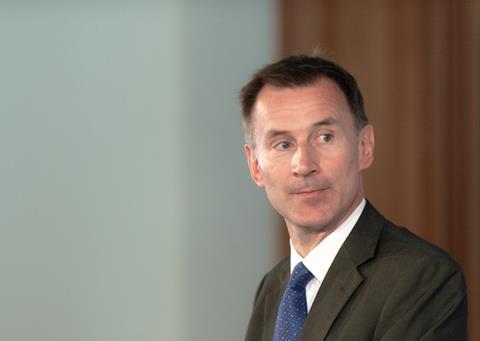
In an unscheduled budget update today (17 October), Chancellor of the Exchequer Jeremy Hunt (pictured) has announced that the government will reverse almost all tax decisions made in the mini Budget in September, aside from those already in the process of Parliamentary legislation.
Following the Mini Budget, which removed bankers' bonus caps, scrapped the 45% tax rate above £150,000, dropped the income tax basic rate to 19% a year early, and moved to reduce strike action through union regulation, the government has faced considerable backlash. This resulted in the resignation of Kwasi Kwarteng as Chancellor.
Hunt, who replaced Kwarteng as of 14 October, said that the government has since decided to reverse its decision on cuts to dividend tax rates, and will no longer reverse off-payroll working reforms. However, it will continue with the scrapping of temporary national insurance (NI) increases.
The government has also reversed its plan to reduce the basic rate of income tax to 19% one year early, and has in fact committed to keeping the rate at 20% indefinitely. This means the previous plan, to cut the rate to 19% from April 2023, is no longer in place.
Hunt said: "It is a deeply held conservative value, and a value that I share, that people should keep more of the money they earn. But at a time when markets are rightly demanding commitment to sustainable public finances, it is not right to borrow to fund this tax cut, so I've decided that the basic rate of income tax will remain at 20%, and it will do so indefinitely until economic circumstances allow for it to be cut. Taken together with the decision not to cut corporation tax and restoring the top rate of income tax, the measures I've announced today will raise, every year, around £32 billion."
As many Brits face rising energy bills as part of the cost-of-living squeeze, Hunt confirmed that the government would continue with its energy price guarantee.
He said: "The biggest single expense in the growth plan is the energy price guarantee. This is a landmark policy supporting millions of people through a difficult winter. Today I want to confirm that the support we are providing from now through April next year will not change, but beyond that, the Prime Minister and I have agreed it would not be responsible to continue exposing public finances to unlimited volatility in international gas prices, so I am announcing today a Treasury-led review in to how we support energy bills beyond April next year. The objective is to design a new approach that will cost the tax payer significantly less than planned, whilst ensuring enough support for those who need it."
Finally, Hunt added: "The most important objective for our country right now is stability. Governments cannot eliminate volatility in markets, but they can play their part, and we will do so."
Mohsin Rashid, co-founder of Zipzero, said: "So many U-turns, a Prime Minister now overseeing a fiscal plan completely at odds with the one she campaigned on to get into Downing Street, and the lack of clarity over long-term plans make it impossible for households across the UK to manage their finances and plot a way through the cost-of-living crisis.
"The past month has been beyond damaging and could not have come at a worse time. Another Treasury review to come up with an energy price plan, but yet another delay when what people need is action."











